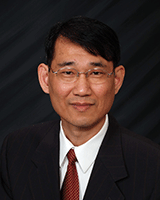Request Username
Can't sign in? Forgot your username?
Enter your email address below and we will send you your username

ASCE Publications: What separates this journal from others in the field?
Chung-Li Tseng: As the name suggests, the journal covers a broad range of energy engineering topics. We publish papers ranging from electric power systems to thermal engineering, to renewable energy, to energy management including planning and policies, and we are very balanced in these areas.
As an ASCE journal, we have the responsibility to service the community of civil engineers. We also take technical papers or case studies addressing energy issues related to environment systems, sustainability, and, of course, civil and cyber infrastructure. Among journals related to energy, our unique identity is that we are broad but with a particular interest in environment sustainability.
ASCE Publications: Can you share a little on your background?
Chung-Li Tseng: Though my Ph.D. is in Operations Research, I started my academic career as a faculty member in the Civil Engineering Department at the University of Maryland. Around that time, I also joined the JEE editorial board. Now I have moved from engineering to business and management, teaching business courses at all levels including MBA.
ASCE Publications: How has the Journal changed during your tenure as editor?
Chung-Li Tseng: When I became the editor, we redefined and expanded the scope of the journal from traditional areas related to civil engineering to more general energy engineering areas. We followed that with several successful special issues to increase our visibility.
Our submission rate has increased significantly in the past few years. With a team of energetic and responsible associate editors, we have made strides to significantly shorten the turnaround time for both first decision and final decision. With these changes, I am pleased to see our impact factor this year increase to 1.944, which is very encouraging. Note: Impact factor of an academic journal is a measure reflecting the yearly average number of citations to recent articles published in that journal.
ASCE Publications: What are the hot topics in your space?
Chung-Li Tseng: For electric power, it’s how to make the energy systems more efficient, cleaner, robust, and/or to be able to better manage intermittent renewable energy sources. This is popular, especially as this is subject to various environmental and energy policies.
In thermal systems, the focus is not much different—to better utilize energy resources and reduce pollution. This is reflected by the themes of our two recent special issues. One is about “Recent Innovations in Advanced Thermal Energy Systems towards Better Utilization of Energy Resources and Cleaner Environment” and the other is “Renewable Energy Utilization and Energy Conservation in Thermal and Power Systems for China’s Sustainable Energy Future”.
ASCE Publications: What are the biggest challenges facing researchers in the near term?
Chung-Li Tseng: Energy research is growing very fast. To keep up with the state-of-the-art and stay relevant is very challenging. I know researchers like to focus, but when things evolve very quickly, that can become difficult.
Energy problems tend to be multidisciplinary and solving them may require expertise from disciplines beyond engineering, for example, policy and economics. While collaboration is definitely necessary, researchers should make an effort to gain a depth of knowledge in more than one discipline in order to collaborate more effectively. I think this also has some implication on how we develop young researchers.
ASCE Publications: What key features do you look for in an article submitted to your journal?
Chung-Li Tseng: We look for any high-quality papers with original contributions that fall within our scope. I especially welcome papers that address multidisciplinary issues and/or integrated energy systems that sometimes are difficult to find reviewers by journals. We will do our best to manage the reviews.
ASCE Publications: What are your aspirations for future of the journal?
Chung-Li Tseng: In the future, I hope the journal will continue to grow and continue to help forward the future of energy engineering.
Learn more about contributing to the Journal of Energy Engineering.